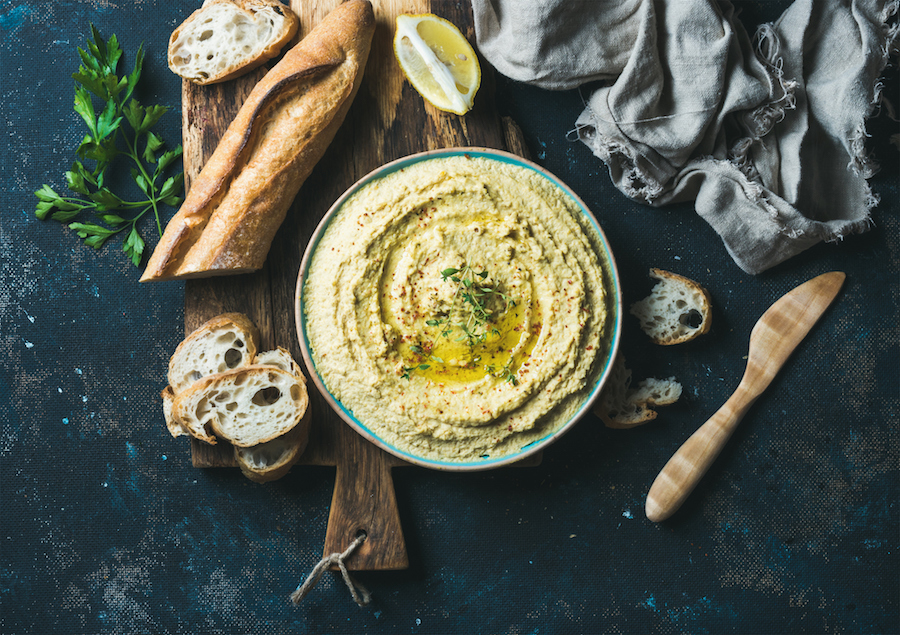5 reasons why hummus is so good for you
However, a global chickpea shortage could mean a hummus price hike
The reports of a price hike might not be good news, but these surprising health benefits to the creamy dip may just soften the blow…
Hummus lovers, try not to run to the nearest supermarket and raid the dip aisle, but there may be good reason to panic.
As well as shortages of prosecco and avocados, there’s another seriously unwelcome effect of ‘the Instagram effect’ that you should know about.
According to food retail magazine The Grocer, we could be heading for a major price hike when it comes to hummus.
The price of the trendy creamy dip has risen by around a third over the past year, and it’s set to increase even further, say the publication.
The reason? Well, it’s largely due to global shortage of chickpeas, thanks to an overwhelming consumer demand for the Levantine dish.
In January 2017, the average 310g tub of hummus cost £1.14. Now however, that has increased by 33p (or 29%) to £1.47.

Devastatingly, the demand shows no signs of slowing down. But it’s no surprise to us really – everyone knows there’s nothing better than a dollop of hummus on a warm pita bread or layer of the creamy purée on a sandwich. Basically, hummus is life.
If you haven’t yet given in to the hype like the rest of the world – here are five super healthy benefits to eating more of it.
Well, before the price hike stops you…
1. It’s a great source of protein
Thinking of going plant-based this year? Then you’ll want to start getting more hummus into your diet. The dish’s main ingredient – chickpeas – are an excellent alternative to meat, thanks to its high protein content. Because hummus is also often eaten with bread, the chickpeas and grains together make up a ‘complete protein’ – which means they contain an proportion of all nine of the essential amino acids necessary for the body to create energy.
2. It can protect you from disease
Research has found that chickpeas can help to balance cholesterol levels, reduce hypertension and protect against heart disease. If that wasn’t enough, a bean-rich diet has also been shown to help balance blood sugar levels too. A 2012 study published in the Archives of Internal Medicine found diabetics who ate at least a cup of legumes for three months as part of their low glycemic index diet improved their glucose tolerance.
3. It alleviates anaemia
Chickpeas are a rich vegetable-based source of iron, with 25% of an adults recommended daily intake in just one cup. These wondrous legumes also contain ample amounts of vitamin C, which aids the absorption of plant-based iron in the blood.
4. It can reduce the risk of blood clots
A 2012 study published in the journal Acta Poloniae Pharmaceutica found that certain types of chickpeas were effective at decreasing inflammation in the body. Chickpeas are also rich in vitamin K and E, two vitamins that have blood thinning properties that naturally help decrease the risk of blood clots.
5. It’s part of the super healthy Mediterranean diet
A study in The New England Journal of Medicine found that about 30% of heart attacks, strokes and deaths from heart disease can be prevented in people who are at high risk if they switch to the Mediterranean diet, which is rich in chickpeas and beans and yep – you guessed it – magical, delicious hummus.
So what are you waiting for? It’s time to toast up some pittas and have a sneaky afternoon snack – your body and your waistline will thank you, although your wallet soon might not.
The Press Association
Latest posts by The Press Association (see all)
- Beatles documentary Let It Be to be released on Disney+ - April 16, 2024
- How to keep your money safe – as criminals ramp up AI tactics to steal consumer data - April 16, 2024
- Seasoned marathon runners give their best race day tips for first-timers - April 16, 2024
- What are heat pumps and could they help your home save energy? - April 15, 2024
- Trailer for Bridgerton season three teases new friends-to-lovers romance - April 12, 2024





















